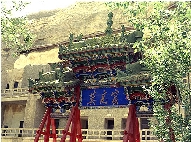 Mogao Caves, also called Mogao Grottoes or the Caves of A Thousand Buddhas, are set into a cliff wall of Mingsha Mountain about 25km southeast of the oasis city in the Gobi desert, Dunhuang. The honeycombed caves, enjoying a millennium long construction from the 4th to the 14th centuries and marking the height of Buddhist art, are the world’s richest treasure house of Buddhist sutras, murals and sculptures. At its height, the cave complex had thousands caves. A total of 492 grottoes remain after thousand years vicissitude, covered with 45,000-square-metre fascinating murals. There are also 2,400 painted statues and over 250 residential caves. Almost every grotto exhibits a group of colorful clean-cut paintings of Buddha and Bodhisattvas, and other religious paintings, or social activities of different dynasties. The caves carved on the cliff wall provide voluminous research materials for the study of all aspects of the social life, such as religion, art, politics, economics, military affairs, culture, literature, language, music, dance, architecture and medical science in mediaeval China. The splendid culture and art unearthed here stimulates worldwide interest and now a new international subject called Dunhuangology forms. Mogao Caves, also called Mogao Grottoes or the Caves of A Thousand Buddhas, are set into a cliff wall of Mingsha Mountain about 25km southeast of the oasis city in the Gobi desert, Dunhuang. The honeycombed caves, enjoying a millennium long construction from the 4th to the 14th centuries and marking the height of Buddhist art, are the world’s richest treasure house of Buddhist sutras, murals and sculptures. At its height, the cave complex had thousands caves. A total of 492 grottoes remain after thousand years vicissitude, covered with 45,000-square-metre fascinating murals. There are also 2,400 painted statues and over 250 residential caves. Almost every grotto exhibits a group of colorful clean-cut paintings of Buddha and Bodhisattvas, and other religious paintings, or social activities of different dynasties. The caves carved on the cliff wall provide voluminous research materials for the study of all aspects of the social life, such as religion, art, politics, economics, military affairs, culture, literature, language, music, dance, architecture and medical science in mediaeval China. The splendid culture and art unearthed here stimulates worldwide interest and now a new international subject called Dunhuangology forms.
|